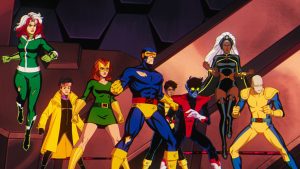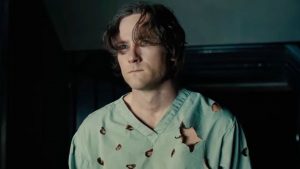
This article contains spoilers for all of Buffy the Vampire Slayer.
Buffy the Vampire Slayer and the show titled after her are both cultural icons. Buffy is one of those series that most sci-fi, fantasy, and horror fans have some kind of awareness of even if they have never watched an episode. It kick-started the careers of Sarah Michelle Gellar as Buffy Summers, Alyson Hannigan as Willow Rosenberg, and David Boreanaz as Angel.
The series was also stuffed to the brim with memorable moments, from the hilarious (Buffy trying to mime staking a vampire in “Hush”), to the kick-ass (Buffy taking out the Judge with a rocket launcher in “Innocence”), to the gut-wrenching (Buffy finding Joyce in “The Body”). But there is one moment that stands out above all the others and embodies what the show is about.
It is the making of the character of Buffy, it is a mission statement for the show, and it is one of the most kick-ass sequences in a series full of them. The moment in question forms part of the climax of what is probably Buffy’s best known story arc: the “Angel goes evil” plot that runs from season 2 episode 13 “Surprise” to the season finale season 2 episode 22 “Becoming Part 2.” In it, Buffy loses her virginity to her vampire boyfriend Angel, but the next morning he does a vanishing act, and it quickly becomes clear that he has lost his soul and reverted to his evil vampire ways, going back to his old name, “Angelus.”
It is revealed that Buffy’s computer teacher Jenny Calendar (Robia LaMorte) is from the gypsy tribe that cursed Angelus and gave him a soul so he would feel terrible guilt for all the people he tortured and killed as a vampire. Jenny’s uncle Enyos (Vincent Schiavelli) tells them – too late – that there was a condition on the curse; if he ever experienced a moment of true happiness, his soul would disappear again and he would revert to his evil vampiric ways.
Buffy realizes that she is going to have to kill Angelus, but at first, in episode 14 “Innocence,” she is unable to do so. As he mocks her, she kicks him in the downstairs department and tells him “Give me time.” The rest of season 2 follows the consequences of that moment, which include the death of Jenny, and the build up to the moment when Buffy is finally able to kill Angel and save the world.
At this point, you might be thinking that this killing is the moment we’ve chosen as the most one in the show. It is certainly iconic. Buffy’s well-meaning friends have re-cursed Angel and restored his soul, hoping to save him, but they are too late. Angelus has already awakened the demon Acathla, who is going to suck the whole world into his hell dimension, and only a sword covered in Angel’s blood will stop it. So Buffy tells him, “Close your eyes,” kisses him, and runs him through the heart with the sword, sending him and the demon back to hell.
Not even the very iffy 1990s TV-budget special effects can dampen the emotion and tragedy of this scene. Sarah McLachlan’s “Full of Grace” starts playing as we see Buffy leave town, tired and empty and thinking that her mother (Kristine Sutherland) has kicked her out of the house (her distraught mother didn’t actually mean it, but Buffy doesn’t know that). It’s been more than two decades, but we still well up just thinking about it.
That isn’t the most important moment though.
The most important moment in the whole show comes just a minute or two earlier. Angelus is still evil and un-souled, and he and Buffy are fighting. Acathla has been awakened, an injured Willow is busy working the curse spell in the hospital, Xander (Nicholas Brendon) has left with an unconscious Giles (Anthony Stewart-Head), and as far as Buffy knows her mother never wants to see her again. As Angelus knocks Buffy to the ground, bats away her sword, and looms over her, even her temporary ally Spike (James Marsters) abandons her (and the world) observing casually that “God, he’s gonna kill her.”
Angelus waves his sword in Buffy’s face, taunting her. “That’s everything, huh?” he says. “No weapons, no friends, no hope. Take all that away, and what’s left?” He goes in for the kill – and Buffy catches his sword in her bare hands, stopping it right in front of her face, and says, “Me.” She knocks the hilt of Angelus’ sword into his face, leaps to her feet, grabs her own sword, and gains the upper hand in the fight, ready to deal the killing blow by the time Willow’s spell works and the curse comes back into force, restoring Angel’s soul.
This is the moment that Buffy the Vampire Slayer is all about. This moment has been built up to, not just through the back half of season 2, but throughout the whole show. It’s a very stark contrast to the finale of season 1 a year earlier. As great an episode as it is, that season finale, “Prophecy Girl,” features a Buffy who was understandably frightened and reluctant, and who had to be kissed back to life (literally, having drowned) by Xander. Here, Buffy is no happier about what she has to do, but she is even more resolved to do it. She is no longer unwilling or unable to kill Angel, but determined to do what is necessary to save the world, and she has the strength of will to keep going and to keep fighting even when she has lost everything.
Buffy is more alone in this moment than at any other time in the series. At first, she is the one and only Slayer, the Chosen One – but she has a Watcher to help her, and she quickly gathers her Scooby Gang around her. Sure, she briefly dies in “Prophecy Girl.” But Xander and Angel are right behind her to save her. As a result of that brief “death,” another Slayer is summoned, Kendra (Bianca Lawson). After Kendra comes Faith (Eliza Dushku), and however bad Buffy and Faith’s relationship gets, they are both always there. And in the series finale, Buffy gains unspecified numbers of fellow Slayers as Willow activates all Potential Slayers around the world. The moment these girls realize they have a new power flowing through them is powerful in itself, and the idea of ending the series by preventing Buffy from ever being so alone again is a lovely one.
But at this moment at the end of season 2, Buffy is completely alone. Kendra was killed by Drusilla (Juliet Landau) at the end of the previous episode. Faith has technically been called but Buffy has no way of knowing who or where she is, and the Scoobies are all incapacitated or otherwise occupied. Given some later developments in the show, it is part ironic and part unintentional foreshadowing that the last person to leave her is Spike, with whom she has just established a shaky alliance. But the fact that even Spike’s self-serving self-interest (and underlying attraction to Buffy, which Marsters was clearly playing from the start even before it was scripted) is not enough to keep him there says something about how dire the situation has become. Buffy has never been so alone before or since.
Writer-director-showrunner Joss Whedon’s feminist credentials may have taken a severe knocking in recent years, but that doesn’t change the power of this moment or of Sarah Michelle Gellar’s performance. Buffy would not have lasted five minutes without Gellar in the lead role. She is able to play the perfect blend of a funny, vulnerable, ditzy teen who is nevertheless fiercely intelligent with a core of absolute steel (qualities Gellar herself showed on set as well). This moment, when Buffy finds the strength of will to keep fighting insurmountable odds and realizes that in the end, no matter what else she has lost, she still has herself, is the true heart of both the character and the series.
Sure, the dramatics belong to the killing of Angel, but he gets better. And there are plenty of other great Buffy moments for the character. We could talk about the moment she takes back her name and her identity in “Anne” and proudly declares, “I’m Buffy, the vampire slayer,” the moment she shows Professor Walsh how badly she has underestimated her in “The I In Team” and tells her, “you really don’t know what a Slayer is,” or her swan dive in “The Gift.” But none of them top this one.
This is the moment Buffy grows up, the moment she understands that she is enough, the moment she realizes that it doesn’t matter what mistakes she has made, or what she’s been through, she is still there and she is alive and she has the strength in her to keep going. There’s a reason this two-parter is called “Becoming.” This moment, as Buffy stops that sword, is the moment all the rest of the show revolves around.
All seven seasons of Buffy the Vampire Slayer are available to stream on Hulu in the U.S. and Disney+ in the U.K.
The post Buffy the Vampire Slayer’s Most Important Moment Features One Word appeared first on Den of Geek.











